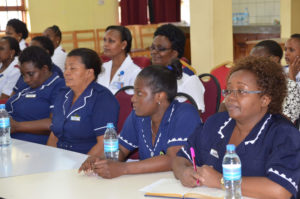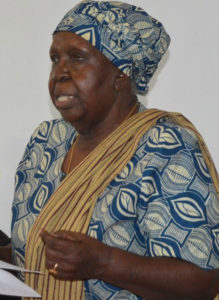by Ben Taylor
Government seeks to allay investors’ concerns
The government sought to reassure investors that the private sector is seen by government as a key partner in Tanzania’s goal of becoming a semi-industrialised middle-income economy by 2025. This followed reports that a number of recent regulatory changes had been introduced that were perceived as unfriendly to business.
The government’s reassurances came at a meeting of more than 50 investors from various countries in Dar es Salaam in October, organised by the Mwalimu Nyerere Memorial Academy.
“In almost every country the private sector is a catalyst for sustainable development. The government acknowledges the contribution of the private sector to the country’s economic growth,” the Permanent Secretary in the Prime Minister’s Office (Policy, Coordination and Parliamentary Affairs), Prof Faustine Kamuzora, told participants in the symposium.
Earlier, some participants had expressed concern about tax rates and a perceived lack of private sector consultation in implementation of mega development projects.
Similar debates were heard elsewhere in Dar es Salaam among a different group of investors. The Second Annual Private Equity in Tanzania Conference, arranged by the East Africa Venture Capital Association (EAVCA), discussed ways of financing the country’s industrial aspirations with the stated aim of “restoring Tanzania’s status as a preferred investment destination in this part of Africa.”
EAVCA executive director Eva Warigia said political and regulatory changes in recent years have projected a negative image of Tanzania to prospective investors. “We think that information circulated through local and international media has damaged our reputation. We therefore called the investors to show them the reality and possible opportunities for investment,” she said. “In any democratic country, political and regulatory shifts are inevitable but truth be told, the Tanzanian government is supportive of the private sector.”
An associate analyst with Control Risks Company, Ms Patricia Rodrigues, assured investors that it is less risky to invest in Tanzania than elsewhere in East Africa. She attributed this to political stability and strong economic growth.
CEO Roundtable of Tanzania chairman Sanjay Rughani, who is also chief executive of Standard Chartered Bank Tanzania, said potential areas for investment include commercial farming, digital services, oil and gas, transport and logistics and social services.
“I have been working in the private sector in the country for a long time and also attend many public-private dialogues in my capacity as CEOrt chairman and member of the Tanzania Private Sector Foundation.
Tanzania falls in ease-of-doing-business survey
Tanzania has fallen to 144th position in the World Bank’s Doing Business Report, from 137th a year earlier. This is the 16th in a series of annual reports investigating regulations that enhance business activity and those that constrain it across the globe. It’s stated aim is to advance both regulatory quality and efficiency.
The Minister of Industry, Trade and Investment, Charles Mwijage, said that Tanzania’s drop in the rankings was a result of various procedural checks instituted to reduce malpractices in the business sector. He said he hopes that the measures instituted will facilitate future improvements. “These rankings don’t give me a headache because we have been dealing with some challenges, and I’m sure the measures we have taken will help to improve the business climate,” Mr Mwijage told The Citizen in an interview.
Among her East African neighbours, Tanzania ranked in fourth place. Rwanda is on top (ranked 29th globally), followed by Kenya (61st) and Uganda (127th), while South Sudan (185th) and Burundi (168th) were at the bottom.
The most challenging issues for Tanzania, according to report, were cross-border trade, protecting minority investors and resolving insolvency.
Mr Mwijage said to address these challenges, the government would continue to implement plans and policies, which include reducing fees and taxes and reducing delays in business transactions. He said Tanzania did not perform well on paying taxes due to the fact that many businesses are informal with owners who consider taxes as a nuisance and not obligation. “We are continuing to change the mindset of our business community because many were used to the ‘business as usual’ way of doing things,” he said.
On delays which have pushed Tanzania down the cross-border trade rankings, Mr Mwijage said these were caused by checks of vehicles to avoid trafficking of arms and people. He also said the government has improved export and import procedures and infrastructure as well as constructing One Stop Border Posts to ease procedures and save time.
Tanzania performed slightly better in starting business, getting electricity, getting credit, enforcing contracts, paying taxes, registering property and construction permits.
Issues raised in the report are similar to those cited in the government’s statement of commitment to increasing the ease of doing business: the Blueprint on Regulatory Reforms to Improve the Business Environment.
The blueprint mentions regulatory inconveniences caused by overlapping of functions of various regulatory authorities, as well as the duplication of registration requirements of the Social Security Regulatory Authority (SSRA), Business Registration and Licensing Authority (BRELA) and Tanzania Employment Services Agency (TAESA). There are also conflicting geographical restrictions regarding work permits and residence permits, the blueprint says.
Overhaul underway at Dar Port
A government initiative – the Dar es Salaam Gateway Maritime Project (DMGP) – has begun implementation, with the aim of enabling the port of Dar es Salaam to operate at world-class level. The project, delivered by the through the Tanzania Ports Authority (TPA), is designed to improve cargo handling at the port.
The first phase of the project will cost an estimated USD $150 million and involves deepening and strengthening existing berths numbers 1 to 11 to 14.5 metres, plus the construction of a new, multipurpose berth at Gerezani Creek. The project will also see deepening and widening of the port entrance channel and turning circle to 15.5 metres, and of the harbour basin in the port to 14.5 metres, plus improving the rail linkages and platform in the port.
TPA says it is aiming to introduce faster truck and wagons turnaround times from the port, and to auction overstayed cargo abandoned at the port, so as to get more space to serve customers and stakeholders in a more efficient manner.
Given the traffic forecast, the TPA-DMGP project follows the growing global trend of creating capacity ahead of demand. This is alongside construction of new ports at Chongoleani in Tanga Region, Bagamoyo and Mwambani Bay and KwalaRuvu Dry Port 47 miles west of Dar es Salaam. The Chongoleani Port will be dedicated to handling crude oil shipments for the upcoming Uganda-Tanzania pipeline.
Expansion of port capacities is being delivered in tandem with the development of inland road and rail networks, including upgrades to the Central Line and TAZARA railways. The completion of the DMGP project and implementation of other projects at various other ports will fast-track Tanzania’s quest for industrialisation and support the regional quest to attain fast social-economic development.



